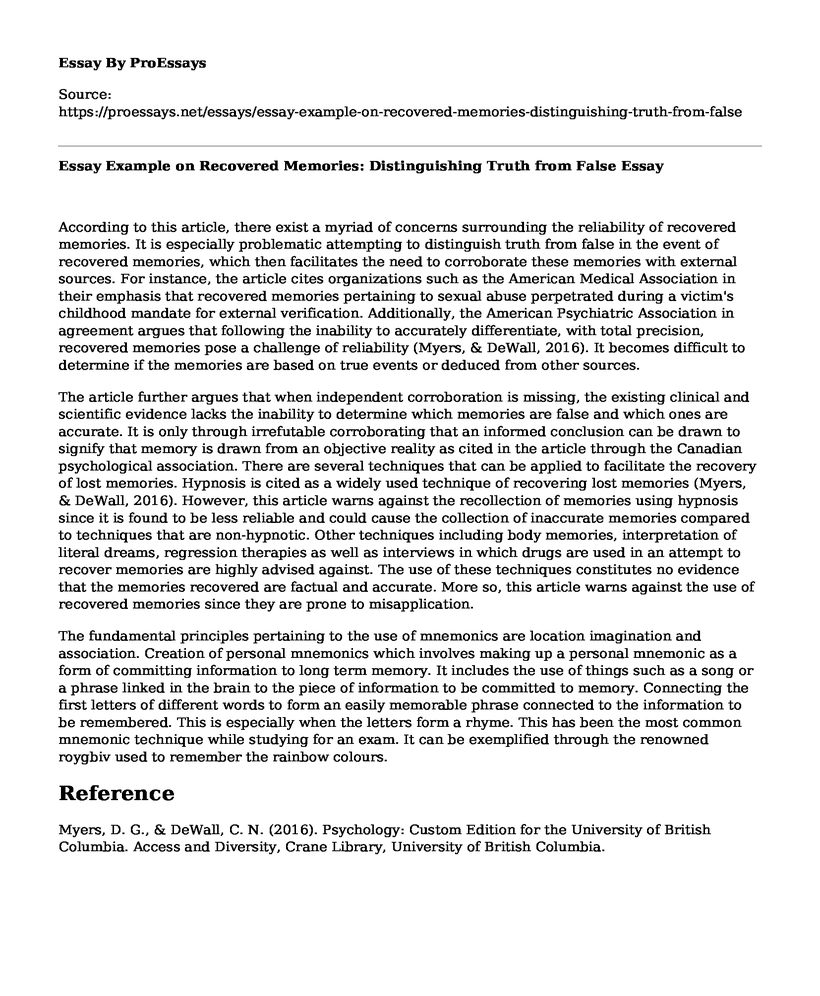According to this article, there exist a myriad of concerns surrounding the reliability of recovered memories. It is especially problematic attempting to distinguish truth from false in the event of recovered memories, which then facilitates the need to corroborate these memories with external sources. For instance, the article cites organizations such as the American Medical Association in their emphasis that recovered memories pertaining to sexual abuse perpetrated during a victim's childhood mandate for external verification. Additionally, the American Psychiatric Association in agreement argues that following the inability to accurately differentiate, with total precision, recovered memories pose a challenge of reliability (Myers, & DeWall, 2016). It becomes difficult to determine if the memories are based on true events or deduced from other sources.
The article further argues that when independent corroboration is missing, the existing clinical and scientific evidence lacks the inability to determine which memories are false and which ones are accurate. It is only through irrefutable corroborating that an informed conclusion can be drawn to signify that memory is drawn from an objective reality as cited in the article through the Canadian psychological association. There are several techniques that can be applied to facilitate the recovery of lost memories. Hypnosis is cited as a widely used technique of recovering lost memories (Myers, & DeWall, 2016). However, this article warns against the recollection of memories using hypnosis since it is found to be less reliable and could cause the collection of inaccurate memories compared to techniques that are non-hypnotic. Other techniques including body memories, interpretation of literal dreams, regression therapies as well as interviews in which drugs are used in an attempt to recover memories are highly advised against. The use of these techniques constitutes no evidence that the memories recovered are factual and accurate. More so, this article warns against the use of recovered memories since they are prone to misapplication.
The fundamental principles pertaining to the use of mnemonics are location imagination and association. Creation of personal mnemonics which involves making up a personal mnemonic as a form of committing information to long term memory. It includes the use of things such as a song or a phrase linked in the brain to the piece of information to be committed to memory. Connecting the first letters of different words to form an easily memorable phrase connected to the information to be remembered. This is especially when the letters form a rhyme. This has been the most common mnemonic technique while studying for an exam. It can be exemplified through the renowned roygbiv used to remember the rainbow colours.
Reference
Myers, D. G., & DeWall, C. N. (2016). Psychology: Custom Edition for the University of British Columbia. Access and Diversity, Crane Library, University of British Columbia.
Cite this page
Essay Example on Recovered Memories: Distinguishing Truth from False. (2023, May 30). Retrieved from https://proessays.net/essays/essay-example-on-recovered-memories-distinguishing-truth-from-false
If you are the original author of this essay and no longer wish to have it published on the ProEssays website, please click below to request its removal:
- Youth Suicide Prevention Essay
- The Relationship Between Unemployment, Physical Health, and Mental Health
- Reflective Essay on Yourself and Others
- Essay Sample on Aging: Blessing or Curse?
- 21-Year-Old College Student: Voices, Rage, and Crying - Essay Sample
- Mental Illness & Juvenile Offenders: A Worrying Issue - Annotated Bibliography Sample
- Managing Diversity and Decision-Making in Organizational Behavior: A Case Study Analysis







